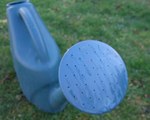 Go to main content
Go to main content
Archive Website of the UK government
Please note that this website has a UK government accesskeys system.
Main menu
Page menu
Environment and greener living

Water: using less in the garden

In hot and dry weather, water used outdoors can amount to 50 per cent of total UK usage. It is still possible, however, to have a beautiful and productive garden using less water. Find out what you can do to make the most of rainwater, and reduce the amount of mains water you use.
Why saving water in the garden is important
Increasing demand for water puts a strain on natural resources, and makes it important to find ways of conserving this valuable resource.
Saving water in the garden can help reduce your water bills, cut the risk of drought orders and water restrictions, and help protect wildlife.
Install a water butt
Thousands of litres of rainwater fall on the average roof every year. Collecting this water and using it on your garden is better for your lawn and plants as well as for the environment.
Putting a water butt in your garden is easy, and quite cheap. Many water companies sell reduced-price water butts, so check with your water company to see what they can offer.
To collect more water than can be stored in one butt, you can buy a connector kit to link up two or more together.
You can find more advice on fitting a water butt from the Act on CO2 website.
Everyday watering tips
When you are watering your plants there are many things you can do to make better use of water in your garden:
- use a watering can instead of a hose
- if you do use a hose, use a trigger to control the flow
- avoid using watering can roses, except on young seedlings, as much of the water doesn't reach the roots where it’s needed
- watering early in the morning or late at night means water doesn't evaporate in the heat of the day before it can reach the roots
- leave plants and shrubs dry until they show signs of wilting – watering too often can keep roots shallow and weaken plants
- weed regularly to make sure that watering helps plants and not weeds
- prioritise young plants and seedlings; more established plants will survive longer periods without water
Saving water while keeping your lawn healthy
Lawns are usually the thirstiest part of a garden. A sprinkler, for example, can use as much water in an hour as a family of four uses in a day. There are easy steps you can take to reduce the amount of water your lawn needs:
- let the grass grow longer in dry spells to help keep moisture in the soil
- try not to use a sprinkler; if you do, your water company may require you to have a meter fitted
- infrequent soaks will be more effective than frequent sprinkling as they will encourage roots to search for water deeper in the ground
- even if your lawn goes brown in dry weather, it doesn’t mean it has died – it will usually recover when the rain returns
- if you’re redoing your lawn, choose grass varieties that are better suited to dry conditions, like fescue grass or smooth-stalked meadow
Make use of greywater in the garden
Any water that has been used in the home, except water from toilets, is called greywater, and can be used in the garden.
You can use water left over from washing up, water used to wash the windows, or the car, as well as shower, sink and laundry water.
There are a few precautions you should take when using greywater in the garden:
- make sure it is cool before you use it
- avoid pouring it straight on to foliage
- use greywater from baths and showers to water only non-edible plants
Plan a water-efficient garden
As the climate changes, so will the plants that do well in your garden. Some traditional plants may struggle with less water. You can keep your garden looking good by:
- choosing drought-tolerant plants that need less water
- making your own compost from kitchen waste to retain moisture and nutrients
- planting new shrubs and trees through plastic helps to retain moisture and control weeds
More useful links
Useful contacts
In this section...
- Controlling pests and weeds: greener choices
- Choosing peat-free soils and fertilisers
- Sheds, greenhouses and garden furniture: greener choices
- Barbecues and outdoor heaters: greener choices
- Encouraging wildlife in your garden
- Grow your own fruit and vegetables
- Composting
- Greener gardening: a quick guide
 Facebook
Facebook Twitter
Twitter StumbleUpon
StumbleUpon Delicious
Delicious Reddit
Reddit
